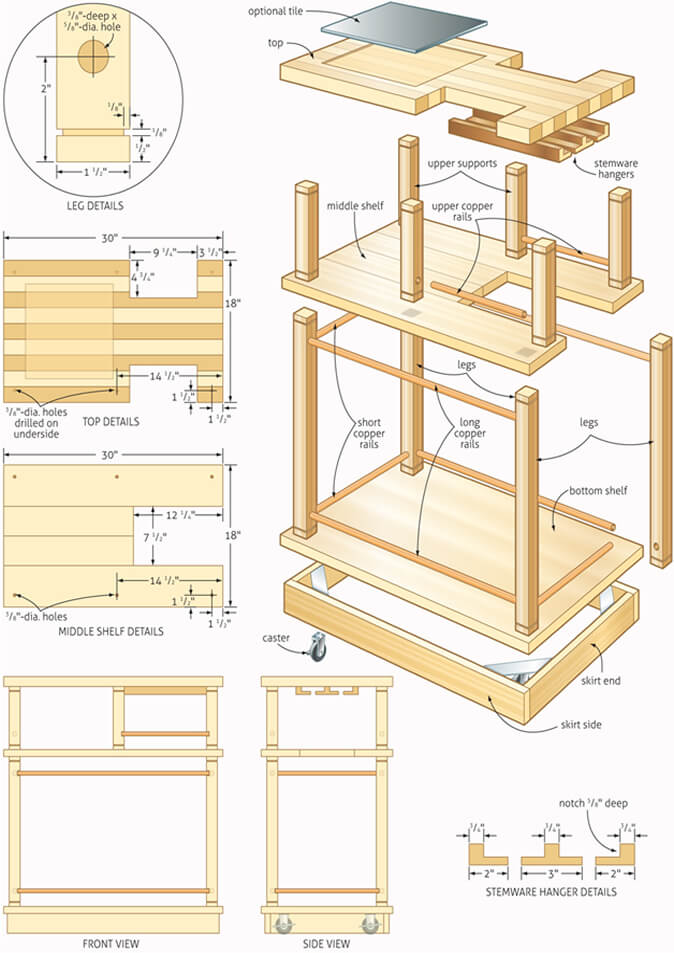Building a garage seems like an easy task. But think again! Garages require a host of considerations before you commit to construction. Think about the height, the width, how you want to use it, and the placement of wall furniture.
Let’s take a look at garage sizes in more detail.
1-Car Garage Dimensions
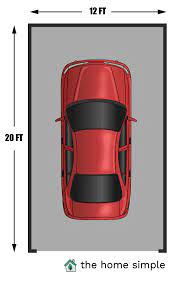

When working out the space, allow 288 square feet for each car. If you do that, when you scale up the sizes, all you need to do is multiply the square footage.
Typically, the average 1-car garage is about 20 ft x 12 ft wide to allow the car doors to open. The average height is 7 ft, which takes into account the overhead garage door mechanism.
Increasing those measurements by a few feet allows for extra storage. Try 24 ft x 16 ft x 8 ft as another example. This gives you the space to move around the car.
It is also a much better size if you drive a crossover SUV, given the extra length, width, and height. You will need a garage door width of about 7 ft x 8 ft to allow for wing mirror clearance.
For a truck or SUV, increase the measurements again to between 28 ft in length by 16 ft in width and 8 ft in height. The garage door would also need to be wider, at about 9 ft x 8 ft.
2-Car Garage Dimensions
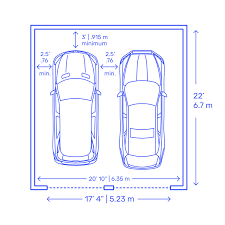

Families often use 2-car garages in two ways: one for storing the car safely, and the other for storage or as a workshop. Typically, 2-car garages are a minimum of 22 ft wide and 20 ft deep.
They also have twin garage doors measuring between 9 and 10 ft, although it isn’t uncommon to have an extra-wide 16 ft door.
When making your calculations, ensure there is a minimum of 7.5 ft for car door clearance. Most 2-car garages range in width from 22 ft to 26 ft to give greater clearance around the car.
If you are parking mid-size cars, these dimensions would be ample, but if you want to house 2 trucks, you might want to go for the maximum length of 24 ft to compensate for the increased size.
2-car garages generally range in size from 400 to 600 square feet, depending on the vehicle.
3-Car Garage Dimensions
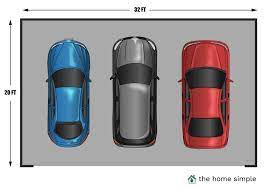

Things can become more complicated when you are dealing with multiple-car garages. You need to allocate enough clearance for each car door to open.
The average size of a 3-car garage is about 32 ft x 22 ft. The height doesn’t really change between the garage sizes unless you are catering for a specific vehicle.
These measurements are based on the average size family car, but you might want to increase the length and width if you have a larger vehicle. If you have multiple SUVs, you will need more space than mid-size cars.
Typically, 3-car garages have either triple doors measuring 7 or 8 ft wide or a combination of a 16 ft wide door and a single door.
Unless you want to use your garage as a workshop, there is only enough breathing room between the vehicles to allow passage because space is limited.
The average square footage of a 3-car garage is between 576 and 864 square feet.
4-Car Garage Dimensions
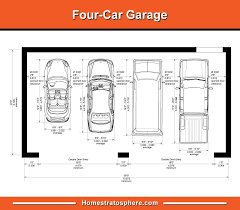

On average, a 4-car garage measures between 34 to 36 ft in width and typically have twin 16-ft doors.
As with the 1 and 2-car options, they are pretty standard unless you are looking for a specific height. 4-car garages have a length spanning 20 to 24 ft, but this can change depending on the vehicle size.
Like the 3-car option, there isn’t much space between vehicles, with just enough access to get in and out.
If you design something bespoke, the sizes can be anything you want, depending on how you want to use the space and the land you have available.
The average size range for a 4-car garage is between 1150 and 1300 square feet. This gives you enough room to open the doors of each car individually without fear of damage.
Considerations For Garage Sizes
There are so many variables when designing and building a garage, but it is important to focus on some basics first.
Let’s Talk About Size
A garage may seem like a simple space, but it needs to have clearance for your car and garage door mechanisms, plus wall storage and room to work. When it comes to garages, size really does matter.
Height
Don’t underestimate the importance of height, vehicle clearance, overhead storage, lighting, and garage door openers. Even your vehicle’s antenna is a consideration as it is the tallest part of the car.
Width
Whether you are using a parking sensor or not, you will still need a decent amount of clearance within the garage.
Trying to squeeze out the doors is not fun, especially if you are less able than others, and if you want your paintwork scratch-free.
Plus, the right amount of clearance makes it easier to perform maintenance tasks on your car. Also, garages contain equipment, so think about your storage options when choosing the width.
On average, each separate garage door needs a minimum of 1.4 feet of wall to separate them. If you have more than one door, you need to factor this into your measurements.
Depth
You should be able to walk around your car while it is parked. Depth is a common miscalculation when designing a garage. Also, most tools are located on the end wall in front of your vehicle.
How You Use It
Garages aren’t just for cars. Many owners use their garage space for practical things like woodworking, metalwork, and hobby pursuits. You can create a mess without worrying about the disturbance.
Plan For the Future
You might not always drive the same car, so if you build your garage around your existing vehicle, it will cause issues later when you swap it for a larger model.
Try and build in all eventualities into the design. It helps you future-proof your garage.
What Are the Costs?
The costs vary depending on how many cars you have and what you want to do with the space. The average dollar per square foot stands at $35 to $60. Here are the average figures:
|
Garage Type |
Average Dimensions Ft |
Average Square Footage |
Average Costs |
|
1-car |
20 x 12 |
264 to 288 |
$7,500 to $14,200 |
|
2-car |
20 x 22 |
400 to 600 |
$19,600 to $28,200 |
|
3-car |
32 x 22 |
576 to 864 |
$28,200 to $42,700 |
|
4-car |
36 x 24 |
1150 to 1300 |
$42,700 + |
Top Tip: Always allow an extra 5 or 6 feet clearance on the sides for the car’s doors to open. If you go too narrow, it will damage your vehicle.
Average Vehicle Sizes
To decide on garage sizes, you must first have an understanding of typical vehicle dimensions. Cars come in all shapes and sizes, so the best way to do this is to categorize them into groups.
Small Cars
Typical models: Kia Rio, Chevy Cruze, Mazda 3, Mini, Ford Focus, Toyota Corolla.
- Average length: 15 ft
- Average width: 6 ft
- Average height: 5 ft
Medium-Size Cars
Typical models: Toyota Camry, Audi A4, BMW 3 Series, Honda Accord.
- Average length: 16 ft
- Average width: 6 ft
- Average height: 5 ft
Full-Size Cars
Typical models: Dodge Charger, Chevy Impala, Chrysler 300, Toyota Avalon.
- Average length: 17 ft
- Average width: 6.5 ft
- Average height: 5 ft
Medium-Size Trucks
Typical models: Ford Ranger, GMC Canyon, Chevy Colorado, Nissan Frontier.
- Average length: 18 ft
- Average width: 6.5 ft
- Average height: 6 ft
Large Trucks
Typical models: Ford F-150, GMC Sierra 1500, Dodge Ram 1500, Chevy Silverado
- Average length: 19.5 ft
- Average width: 7 ft
- Average height: 6.5 ft
Crossover SUVs
Typical models: Honda CR-V, Toyota RAV-4, Hyundai Santa Fe, Mazda CX-5.
- Average length: 15.5 ft
- Average width: 6 ft
- Average height: 6 ft
Medium-Size SUVs
Typical models: Ford Explorer, Dodge Durango, Honda Pilot, Kia Sorento.
- Average length: 16.5 ft
- Average width: 6.5 ft
- Average height: 6 ft
Large SUVs
Typical models: Cadillac Escalade, Ford Expedition, Chevy Suburban, GMC Yukon.
- Average length: 17.5 ft
- Average width: 7 ft
- Average height: 6.5 ft
Attached Vs. Detached
Which is better and which is cheaper to build?
Attached
Attached garages are less expensive to build because you only have to construct 3 walls instead of 4. It’s also cheaper to install mains electricity, lighting, and water because the services are already in your home.
They are also more convenient because of their proximity to your house. In bad weather, you can get access with the minimum of fuss. Some even have connecting doors to the main property.
Attached garages increase property values, with most investments seeing 80 percent returns on property values. They are also cheaper to build, costing on average $27,000.
There are some downsides to attached garages. They are a greater fire and security risk. They don’t fit with every plot, restricting what you can build, and they may incur more expensive building permits.
Detached
Detached garages are located away from the main home, so if you undertake any noisy work, such as using a compressor, then you are less likely to disturb anyone’s peace.
They also have greater scope to expand because you can locate them anywhere in the yard. This gives you room for more cars.
Like attached garages, detached ones also increase your home’s curb appeal and add to the overall value. Plus, they fit the plot better because you choose where to locate it rather than work within your existing home’s constraints.
There are negatives with detached garages. They are less convenient to get to and use, especially in bad weather. Running amenities like gas, electricity, and water is also more of a challenge.
They take up valuable yard space, which could have better uses. Also, some homeowner associations may not allow it.
Is a Carport a Better Option?
Carports are easier to build and cost less. They also take less time to construct. They offer adequate protection levels for your vehicle from the rain, snow, and sun, but your car is not as secure.
Garages conceal your vehicle and lock it away. Thefts from garages are rarer than from carports.
The other consideration is the aesthetics of your property. Typically, a carport is a metal structure that sits on your plot, detached from the house. They are not as attractive as garages.
Then there’s the increase in the value of your home to consider. A carport adds a small amount but nowhere near the levels of a garage.
Finally, some cities may require you to have a permit to erect a carport, although unlikely. In contrast, a garage permit is required in most places because the construction material needs to be fire-retardant and the electrics certified.
Do I Need a Permit For a Garage?
Each city or region sets its own rules, but they are pretty straightforward when it comes to building a garage. The garage might need to be constructed from fireproof materials, or the electrics and plumbing might require a permit.
In some areas, it depends on the size of the garage. In some local zoning departments, single-car garages don’t need a permit, but double-garages do.
Your structure needs to be single-story, less than 750 square feet, minus a roof deck, and with beams spanning 14 ft or less to qualify for a subject-to-field-inspection permit.
If the garage meets all these requirements your garage complies with the planning laws.
Keep Your Car Secure Behind a Garage Door
Knowing what size to build your garage is crucial. If you are a multi-car family, keeping everyone’s car secure is a priority. Also, having that extra space for other tasks is a real bonus.
A garage is not just a place where your car sleeps; it could be a gym, a workshop, a storeroom, and even a laundry room.

